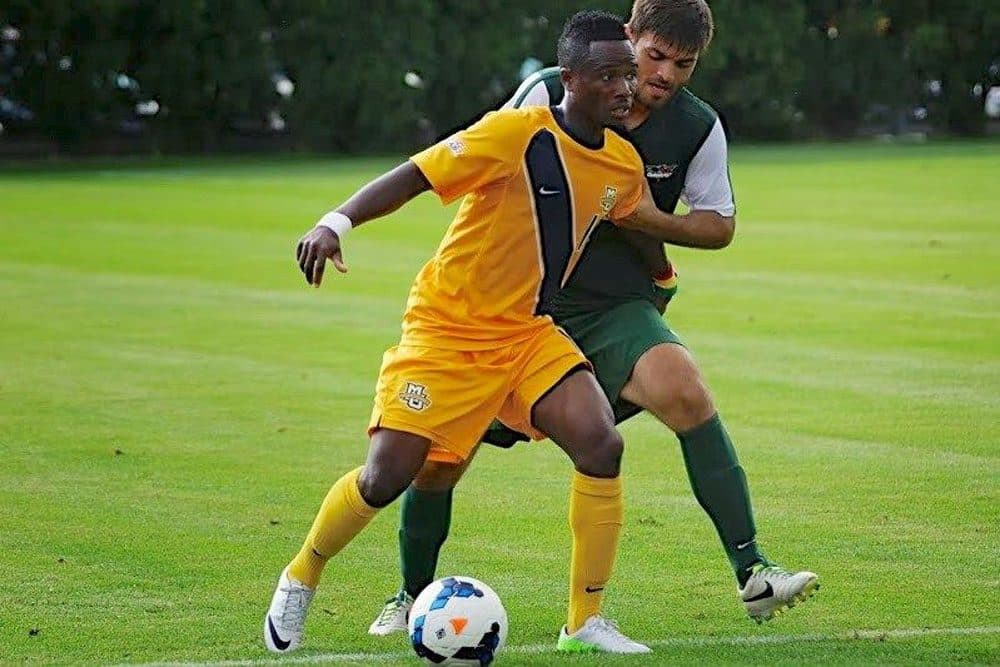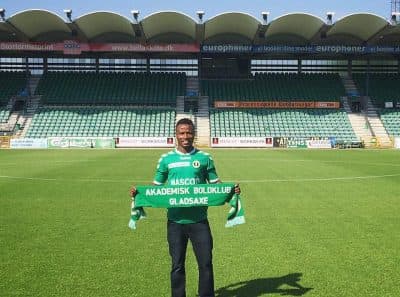Advertisement
From Ghana To Marquette: How Soccer — And Luck — Changed C. Nortey's Life
Resume
James C. Nortey, who goes by the initial “C,” grew up in Accra, the capital of Ghana. It wasn’t easy.
"I have four siblings: two brothers, two sisters, and my dad walked out of our life when I was very little. So I had to live with my mom," Nortey says. "I lived in the city, in Accra, and there’s a lot going on, and playing with friends, and going here and there, playing street football. It was a lot of fun growing up, but it’s also a lot of, you know, you kinda have to have a tough skin to grow up in an environment like that."
Nortey, the oldest child in his family, had to fit in street football – or soccer – between whatever opportunities he could find to make sure everybody at home had enough to eat.
"I was helping my mom bring some money home and I was selling soft drinks and tomatoes and bread and stuff like that on the street," Nortey says. "I had two puppies at the time. And Labadi Beach was a place where a lot of foreigners come. And I know they love puppies, so I bring my puppies over there. They would play with them, and then I said, 'Pay some money for playing with the puppy.'"
Nortey says lots of the people he knew woke up each day trying to figure out where they could find another dollar or two.
But he was a better soccer player than a lot of those other kids playing in the street. Nortey was good enough to dream that he might play somewhere else.
And fortunately for C. Nortey, there has been somewhere else nearby, at least since 1999. That’s when Tom Vernon, a former scout for Manchester United, started the Right To Dream Academy. Its purpose is to discover promising soccer players who are also interested in learning something about the world at large, and how they might work to grow into taking responsible places in it.
Would it sound too much like a fairytale if I were to suggest that Nortey was plucked from the street by the Right To Dream people when they recognized his potential as a soccer player and as a student? Yeah, it would. So I won’t. And neither will Nortey.
"Actually, I wasn’t actually selected to join," Nortey says. "A friend of mine was selected, and I just happened to have the money for transportation to get to the Right To Dream. And he doesn’t have any money, so I said, 'OK, I’m just going to come with you and get some second chance.' But he wasn’t too happy about it, because if you come with me, maybe they will say, 'He will miss his chance, too.' So we both kind of risked it and we went. And I was really, really lucky, because at the time, they only had one goalkeeper. So they needed another goalkeeper to run the drills. And so I stayed, I trained, and I watched people go home every day until there was 16 of us. And they actually registered me as a Right To Dream player."
"You need to have some values, because you’re gonna be done with football at age 30-something, and there’s a lot of life left to live."
So, success. But making it into the program came with consequences.
"It was gonna be tough leaving home," Nortey says. "It means that money’s not coming home anymore. And at the time, my mom wasn’t happy. But I’m going to receive education, I’m going to play the football that I love and I’m going to be with people that are going to develop me as a person, as a footballer."
At first, “leaving home” didn’t mean leaving Ghana. Nortey moved to the academy, about 90 kilometers away, when he was 11. But when he was 15, “leaving home” got a lot more serious: Nortey received a scholarship to Hotchkiss, a prep school in rural Connecticut. “Culture shock” doesn’t begin to describe that transition:
"When I first got to the Hotchkiss School, I thought I was in heaven," Nortey says. "That place was special. From the food, people, how people talk, how people carry themselves around. I was doing the things that I was supposed to do and enjoying people and enjoying school and staying quiet."
Life might have gone on that way during Nortey’s first year at Hotchkiss if his mother hadn’t passed away. He returned home to Ghana as quickly as he could. He assumed that’s where he would remain.
"It was very difficult being home, because I could just see in the faces of my siblings, like, what are they going to do now? They don't say it, but I could see it," Nortey says. "There’s no way I could leave my siblings like that. What are they going to do? How are they going to feed themselves? Who is going to take care of them? So I actually wrote a letter to Hotchkiss that I can’t come back. Not now, anyway. Maybe in the future, if they will accept me to come back, then I will. But right now, I cannot. And I wrote that letter, and I show it to my uncle, and he said, 'OK, I’m not going to allow you to send this letter to Hotchkiss.' So he told me, 'You need to go back. Leave your siblings for me, and I’ll do my best to help them.' And so I think it was because of him that I came back to Hotchkiss."
And it was because he came back to Hotchkiss – and because he played soccer there – that C. Nortey caught the attention of the soccer coach from Marquette University, who’d actually come to a Hotchkiss game to check out another player. Are you beginning to see the part serendipity played in this young man’s journey?
Anyway, all he did when he got to Marquette was become the school’s sixth all-time leading scorer, earn the team’s Most Valuable Player award and score a record number of game-winning goals — all of which suggests strongly that at some point he’d stopped playing goalie.
Nortey graduated in December 2015. The following spring he began working with young players associated with FC Nordsjaelland in Denmark, a team partially owned by Tom Vernon of the Right To Dream Academy. Nortey helps teenage players learn the game and the discipline and integrity he says he acquired at Right To Dream. He’s also begun his career as a pro player at Akademisk Boldklub, known – at least locally – as AB. There, his vocabulary in Danish has expanded.
"I know simple things like, 'Hey, how are you?' and 'I’m good,'" Nortey says. "And I know football terms like, 'press,' 'left,' 'right,' 'Come on, guys!' and stuff like that."
Looking back, Nortey can appreciate becoming the first college graduate in his family. He says most people in Ghana leave school when they’re 13 or 14.

"It felt really good, and it was a good example to set for my siblings and friends at home and my community," Nortey says. "You know, they’re gonna recognize that. And it’s gonna have an impact on them, especially my siblings. I know it’s gonna have an impact with them."
In fact, it already has…at least on one younger brother.
"Eben. He’s always wanted to go to school. I think he’s the smartest in the family," Nortey says. "So he applied for only two schools, and he got into one of the better schools, universities, in Ghana. And it’s a business school. And that’s what he likes to do. I was like, 'OK. I need to do something to help.'"
What C. Nortey did was raise Eben’s tuition money through GoFundMe.com. So that’s another family member on the way to a degree. And that’s only one manifestation of Nortey’s on-going determination to mentor other youngsters, having learned how significant that kind of help can be, which is why he studied social welfare and justice at Marquette.
"I want to organize something in Ghana," Nortey says. "Like a charity program, or like a volunteer program in my community, where I could get a lot of volunteers from a different part of the world to come to my community and maybe do some mission work, maybe teaching, coaching, being around these kids in my community. Just talking sometimes could even change their demeanor. And that’s what I got from Right To Dream. Like, of course I learned a lot there, but sometimes being with these volunteers from a different part of the world, hearing them talk to me, hearing their values, you know, it kind of changed me. You need to have some values, because you’re gonna be done with football at age 30-something, and there’s a lot of life left to live."
There is, at that. And it’s easy to imagine that no matter how well he performs as a soccer player, the best and most rewarding parts of C. Nortey’s life will happen after he’s moved beyond the pitch.
This segment aired on September 3, 2016.
